BMW i7 VS Toyota Highlander
BMW i7
The new BMW i7 epitomises luxury and innovation, seamlessly blending advanced technology with elegant design. Its interior offers an unparalleled experience, with premium materials and cutting-edge features that create a tranquil yet engaging atmosphere for both driver and passengers. The i7's performance is both dynamic and efficient, demonstrating BMW's commitment to sustainable driving without compromising on the exhilarating drive the brand is known for.
detailsToyota Highlander
The Toyota Highlander is a versatile SUV that seamlessly blends comfort and practicality, making it an ideal choice for families and adventurers alike. With its spacious interior and a clever layout, it offers ample room for passengers and luggage, ensuring every journey is a comfortable experience. Its sophisticated design is complemented by advanced technology features, enhancing both connectivity and safety on the road.
details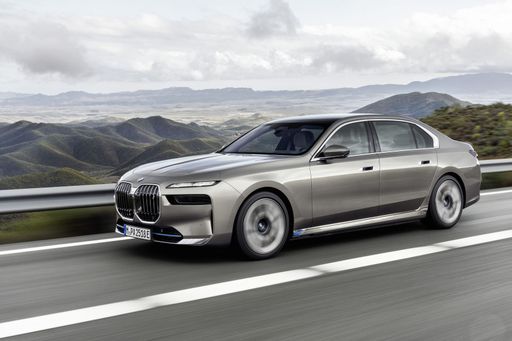 @ press.bmwgroup.com
@ press.bmwgroup.com
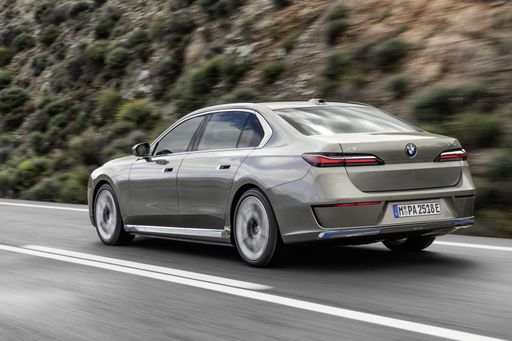 @ press.bmwgroup.com
@ press.bmwgroup.com
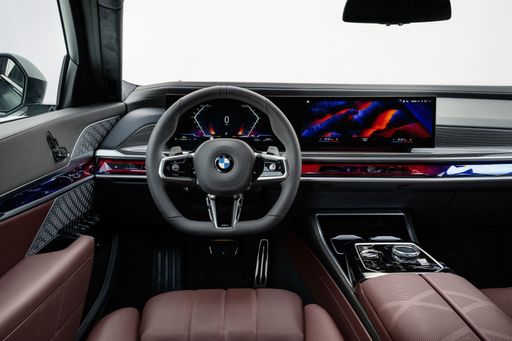 @ press.bmwgroup.com
@ press.bmwgroup.com
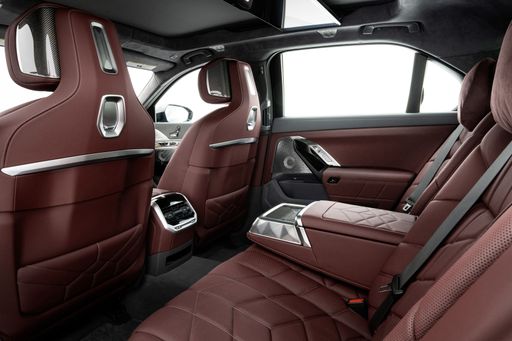 @ press.bmwgroup.com
@ press.bmwgroup.com
 @ Toyota
@ Toyota
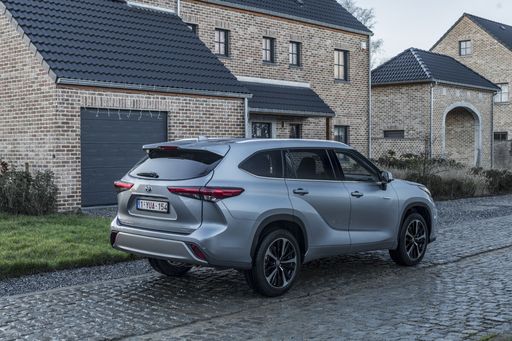 @ Toyota
@ Toyota
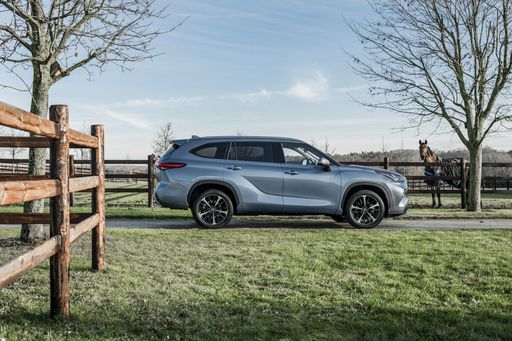 @ Toyota
@ Toyota
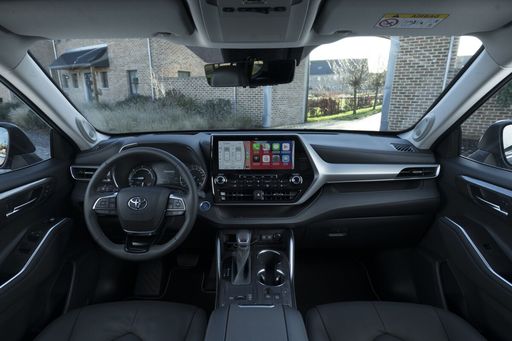 @ Toyota
@ Toyota
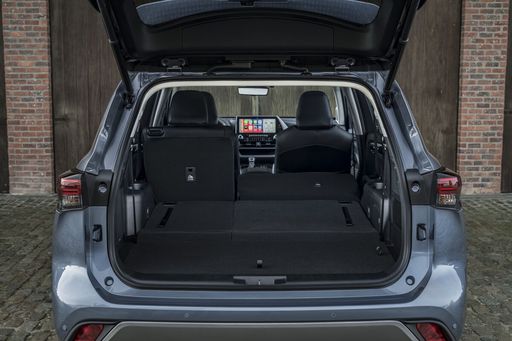 @ Toyota
@ Toyota

|

|
|
|
|
Costs and Consumption |
|
|---|---|
|
Price
about 99200 - 155800
£
|
Price
-
|
|
Consumption L/100km
-
|
Consumption L/100km
-
|
|
Consumption kWh/100km
18.5 - 20.8
kWh
|
Consumption kWh/100km
-
|
|
Electric Range
559 - 623
km
|
Electric Range
-
|
|
Battery Capacity
101.7
kWh
|
Battery Capacity
-
|
|
co2
0
g/km
|
co2
-
|
|
Fuel tank capacity
-
|
Fuel tank capacity
-
|
Dimensions and Body |
|
|
Body Type
Sedan
|
Body Type
-
|
|
Seats
5
|
Seats
-
|
|
Doors
4
|
Doors
-
|
|
Curb weight
2595 - 2770
kg
|
Curb weight
-
|
|
Trunk capacity
500
L
|
Trunk capacity
-
|
|
Length
5391
mm
|
Length
-
|
|
Width
1950
mm
|
Width
-
|
|
Height
1544
mm
|
Height
-
|
|
Payload
480 - 535
kg
|
Payload
-
|
Engine and Performance |
|
|
Engine Type
Electric
|
Engine Type
-
|
|
Transmission
Automatic
|
Transmission
-
|
|
Transmission Detail
Reduction Gearbox
|
Transmission Detail
-
|
|
Drive Type
Rear-Wheel Drive, All-Wheel Drive
|
Drive Type
-
|
|
Power HP
455 - 660
HP
|
Power HP
-
|
|
Acceleration 0-100km/h
3.7 - 5.5
s
|
Acceleration 0-100km/h
-
|
|
Max Speed
205 - 250
km/h
|
Max Speed
-
|
|
Torque
650 - 1100
Nm
|
Torque
-
|
|
Number of Cylinders
-
|
Number of Cylinders
-
|
|
Power kW
335 - 485
kW
|
Power kW
-
|
|
Engine capacity
-
|
Engine capacity
-
|
|
Top speed
205 - 250
km/h
|
Top speed
-
|
General |
|
|
Model Year
2022 - 2023
|
Model Year
-
|
|
CO2 Efficiency Class
A
|
CO2 Efficiency Class
-
|
|
Brand
BMW
|
Brand
-
|
BMW i7
The Pinnacle of Electric Luxury: BMW i7
Introducing the BMW i7, the latest in electric innovation from one of the world's premier automobile manufacturers. Blending cutting-edge technology with luxurious comfort, the i7 represents a significant leap forward in the electric vehicle (EV) market. This article delves into the technical specifications and innovative features that set the BMW i7 apart from its competitors.
Powerful Electric Performance
Under the sleek exterior of the BMW i7 lies a powerhouse of electric capabilities. Depending on the model configuration, the i7 offers between 455 and 660 PS, with a torque of up to 1100 Nm. This ensures an exhilarating driving experience, whether you choose the rear-wheel drive or all-wheel drive configuration. The acceleration is equally impressive, with the i7 capable of going from 0 to 100 km/h in just 3.7 to 5.5 seconds.
Efficient Energy Consumption
The efficiency of the BMW i7 is noteworthy, with an energy consumption ranging from 18.5 to 20.8 kWh/100 km. This efficiency, combined with a substantial battery capacity of 101.7 kWh, gives the i7 an electric range of between 559 and 623 kilometres. BMW’s commitment to sustainability is further underscored by its zero CO2 emissions, reinforcing its status as a premium yet environmentally conscious choice.
Sophisticated Interior and Technology
Inside, the BMW i7 is the epitome of luxury. With seating for five, the interior exudes elegance and comfort. Advanced technology is at your fingertips with features such as the latest iDrive system, providing seamless connectivity and enhanced control over vehicle functions. The i7 ensures you travel in style with its sophisticated Design Pure Excellence, M Sport package, and M Sport package Pro interior trims.
Dimensions and Capacity
The i7’s ample dimensions – with a length of 5391 mm, width of 1950 mm, and height of 1544 mm – are matched by its generous luggage capacity of 500 litres, ensuring practicality alongside luxury. The car's robust build is complemented by a payload capacity of between 480 to 535 kg, ensuring the i7 is as functional as it is stylish.
Cost and Efficiency
With prices ranging from €115,700 to €181,800, the i7 is positioned as a high-end vehicle offering value through its advanced features and performance. The monthly operating costs range between €2,143 and €3,027, while the cost per kilometre is approximately 85.7 to 121.1 cents. Despite its upscale market positioning, the i7 offers competitive efficiency with its remarkable CO2 emission-free driving and energy-saving technologies.
Conclusion
The BMW i7 stands as a testament to the brand’s innovation and dedication to sustainable luxury. By marrying performance, efficiency, and cutting-edge technology, BMW has ensured that the i7 not only meets but exceeds the expectations of discerning EV enthusiasts. The i7 is not merely a car; it is a statement of intent in the future of sustainable luxury. Experience the future today with the BMW i7.
Toyota Highlander
Meet the Toyota Highlander: A Synergy of Power and Efficiency
The Toyota Highlander stands as a testament to modern automotive engineering, blending robust design with state-of-the-art hybrid technology. Designed for families seeking both luxury and practicality, this SUV is more than just a means of transportation—it is an innovative solution to contemporary demands.
Stellar Performance and Hybrid Technology
Under the bonnet of the Highlander lies a full-hybrid powertrain that marries efficiency with performance. Producing an impressive 248 PS, the Highlander doesn't just promise power but delivers it with a refined acceleration from 0 to 100 km/h in just 8.3 seconds. Such performance is coupled with a frugal fuel consumption rate ranging between 6.6 and 7.1 L/100km, setting a benchmark for hybrid SUVs in its class.
A Dynamic Driving Experience
Fitted with a Continuously Variable Transmission (CVT), the Highlander ensures a smooth and responsive driving experience. The all-wheel-drive system enhances safety and control, providing confidence across various driving conditions. With a maximum speed of 180 km/h, this SUV is crafted to perform on both city streets and open highways.
Precision Engineering and Eco-Conscious Design
The Highlander boasts a four-cylinder engine with a displacement of 2487 cm³, perfectly balancing power and environmental considerations. Despite its robust performance, the vehicle remains eco-conscious, adhering to CO2 emissions ranging from 149 to 160 g/km, classified under the CO2 efficiency classes E and F.
Space and Luxury Redefined
Designed with practicality in mind, the Highlander seats seven comfortably, making it an ideal choice for family adventures. Its 241-litre boot capacity, expandable with rear seats folded, ensures storage space is never a concern. From its elegant body design measuring 4966 mm in length to its expansive width of 1930 mm, the Highlander exudes both strength and elegance.
Unmatched Safety and Features
Incorporated within the Highlander are safety features and innovative technologies that enhance every drive. Depending on the trim level—Business Edition, Executive, or Luxury—drivers are offered an array of amenities designed to improve comfort and security.
Cost-Effective Ownership
Though packed with features, the Highlander remains cost-effective. Monthly costs range from €1428 to €1606, with per kilometre expenses of 57.2 to 64.3 cents. This financial feasibility, combined with enduring quality, makes the Highlander a worthwhile investment for conscientious consumers.
Conclusion
The Toyota Highlander transcends the typical expectations of an SUV, providing an exceptional blend of power, space, and technology. Whether navigating urban landscapes or embarking on rural escapes, it promises to deliver with unparalleled versatility and comfort.
